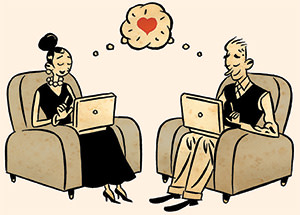Douglas Coupland: notes on 21st-century relationships

Simply sign up to the Life & Arts myFT Digest -- delivered directly to your inbox.
It’s very hard to imagine phoning someone up and saying, “Hey, come over to my house and we’ll sit next to each other on chairs and go online together!” Going online is such an intrinsically solitary act yet, ironically, it fosters the creation of groups and very strong relationships.
…
Last year, at a conference about cities, I met this guy from Google who asked me what I knew about Fort McMurray, Alberta. I told him it’s an oil-extraction complex in the middle of the Canadian prairies and, because of this, it has the most disproportionately male demographic of any city in North America. Its population is maybe 76,000. I asked him why he was asking and he said, “Because it has the highest per capita video-streaming rate of anywhere in North America.” Nudge nudge.
I think that because of the internet, straight people are now having the same amount of sex as gay guys were always supposed to be having. There’s a weird look I can see on the face of people who are getting too much sex delivered to them via hooking up online: wait, is this as good as it gets?
…
Way back on The Mary Tyler Moore Show, Lou Grant asked Mary how many times a woman could be with a guy before she became “that kind of girl”; Mary thought about it very carefully and said “six”. Some psychologists have come to the conclusion that most people have five or six “loves” and once they use them up, that’s it. Sixes get used up very quickly in the new information world.
…
Question: how many times can a person fall in love? Apparently, if you average it out, two-and-a-half times. Men are slightly more inclined to believe in a third-time love than women.
…
People in the pornography industry have found that the magic price point for people subscribing to a porn site is $29.95. The moment you cross that line, potential customers balk and leave. This is called “the porn wall” and it seems to be an impenetrable thing – a constant that’s built into us by nature, like the nesting instinct of birds or the molecular weight of zinc.
…
I remember in the 1990s there was a 30-year-old Latino guy who passed himself off as a hot teenage Latina girl in a Florida high school, and spent a year and a half there before they found out. I think he actually grew stubble once and attended a PTA meeting as his own father.
In certain ways we’ve all become middle-aged Latino guys pretending to be hot cheerleaders, except maybe you’re not pretending to be a cheerleader – you’re pretending to be a macho cowboy or whoever it is you wish you could be to the person on the other end, who has no way of disproving it.
…
Sometimes people really connect online but, of course, they live far away from each other. So, ultimately, one of them buys a plane ticket and flies across the country so they can meet each other in person. If there’s no physical chemistry it leads to one very depressing drink and some desultory conversation before they both go home. People in the matchmaking industry call these people NFH (“next-flight-homers”). But sometimes people really connect online, and when they meet in person they physically click (these people are called “room-getters”).
. . .
I sometimes wonder about people who wake up and spend most of the day online. When they go to bed at night, they’ll have almost no organic memories of their own. If they do this for a long time, you can begin to say that their intelligence is, in a true sense, artificial. Which, I guess, means sex lives have never been as artificial as they are now.
. . .

People seem to be pickier about bodies these days. New high-definition TV cameras have changed the way we look at bodies. Even a faint acne scar looks like the Grand Canyon on a high-def screen. TV casting agents have started to heavily favour actors with perfectly smooth skin. It’s the dermatological equivalent of the introduction of sound into film in 1929.
. . .
I don’t think people being on their devices all the time is an indicator of social isolation. It’s the opposite. In Manhattan, about one person in three on any given sidewalk is using a device. Some people say that’s bad because they’re not “in the moment” – but I think it’s kind of nice because you have visible proof that people need and want to be with other people.
. . .
Once you get used to a certain level of online connection, there’s just no way to go back to where you were before. The thing about 2013 is that people are more connected than they’ve ever been before – except they’ve been tricked into thinking they’re more isolated than ever. How did that happen? Wait – what’s that you’re asking me: am I wearing underwear right now?
——————————————-
Douglas Coupland is the author of ‘Generation X’. His latest novel, ‘Worst. Person. Ever.’, is published by Heinemann
Comments